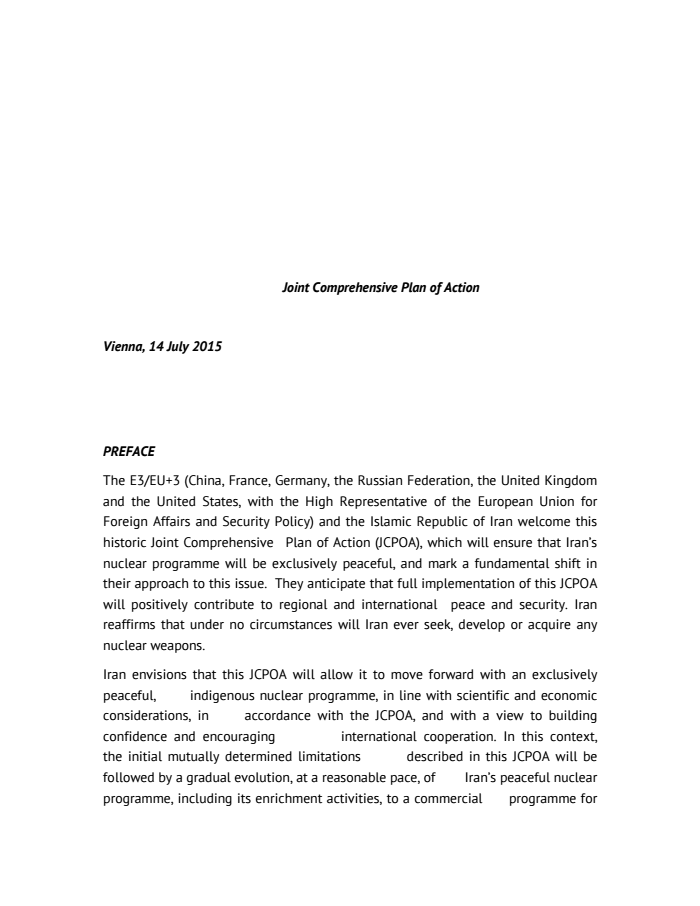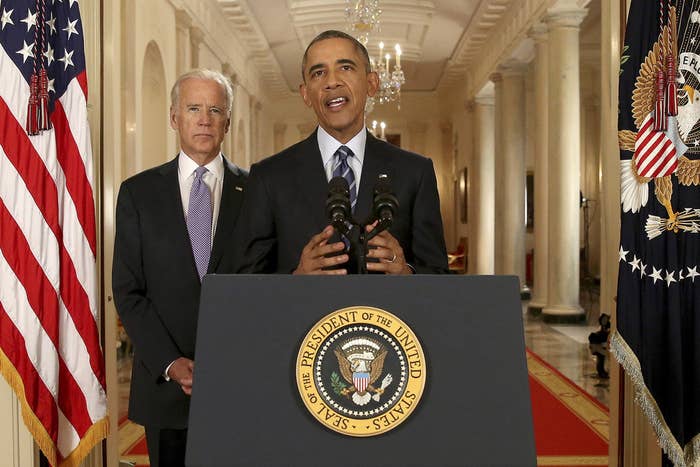
Here's What's Happening:
- Iran and six world powers, led by the United States, have agreed to a deal that curbs Iran's nuclear program in exchange for relief from crippling international sanctions.
- The talks with Tehran have been ongoing for more than a decade. The most recent efforts began after President Hassan Rouhani was elected in 2013.
- Since a temporary agreement was reached in November 2013, deadlines have been repeatedly missed and extended after negotiating countries failed to reach deals in July 2014, November 2014, and again on June 30.
- Iran insists its nuclear program is peaceful.
- President Obama hailed the deal and said it was not built on trust, but verification. He said he would veto any legislative efforts to derail it.
- Iran's President said the deal will "put an end to the inhumane and tyrannical sanctions."
- The European Union's Head of Foreign Policy, Federica Mogherini, said Iran's nuclear agreement with world powers was "not just a deal, but a good deal, and a good deal for all sides."
- Critics believe the deal leaves too much of Iran's nuclear infrastructure in place and overlooks Iran's destabilizing role in the region.
President Obama's Announcement Of The Iran Nuclear Deal
View this video on YouTube
Updates
The U.N. Security Council voted unanimously Monday in favor of the Iran nuclear deal reached last week, the AP reported.
The deal reached last week between Iran and six world powers including the U.S. will provide extensive oversight of Iran's nuclear program to ensure that the country is not building any nuclear weapons. In exchange for meeting certain guidelines and restrictions, the U.N. agreed to lift its sanctions on the country.
"Yesterday was a historic day," said President Obama on Wednesday, the opening line in his first press conference since Tuesday's announcement of the Iran nuclear deal.
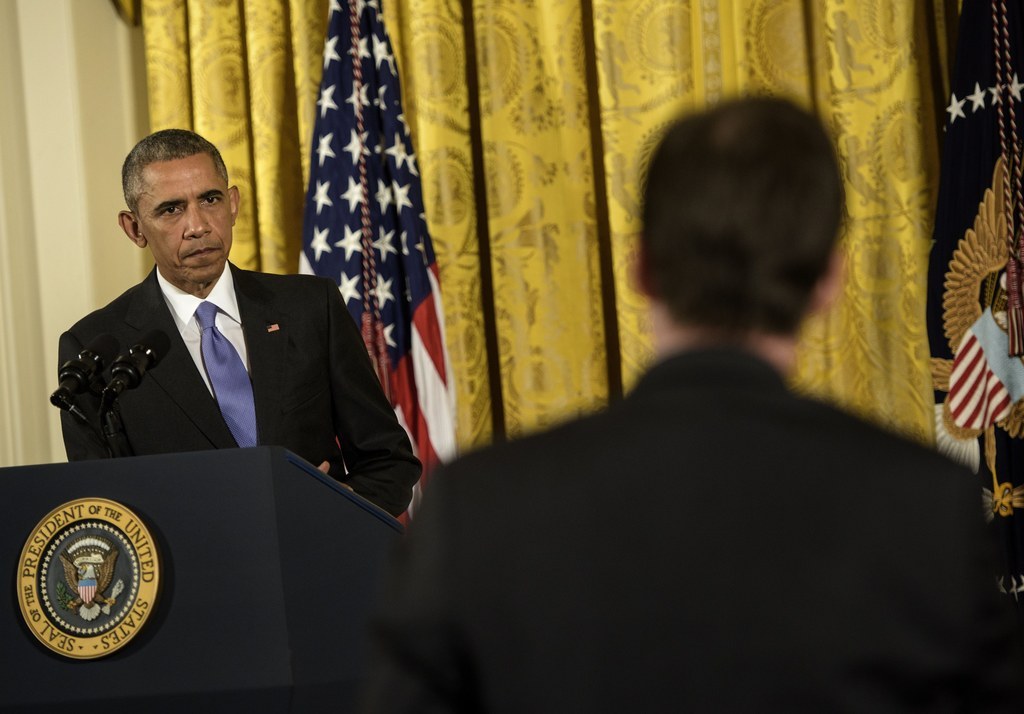
He would go on to call the nuclear deal "an opportunity that may not come again in our lifetime."
The President acknowledged the agreement only solves one particular problem with Iran, but he considers curtailing Iran's nuclear ambitions "our number one priority."
The United States, insisted Obama, will continue to press Iran on issues like belligerence towards Israel, human rights violations, and support of terrorist groups such as Hezbollah.
When asked about the prospects of the deal passing in Congress, Obama says he hopes politics will be put aside for the sake of national security, but added "I'm not betting on the Republican party rallying around this." He reiterated his veto threat if Congress fails to act.
Obama said he understands Israel's reluctance to support the deal, with Prime Minister Netanyahu calling it "historically bad," but countered that neither Israel nor Republicans "have presented to me a better alternative."
He repeated throughout the press conference that the deal does not normalize diplomatic relations with Iran, but said they are a "player" in helping end the conflict in Syria and have influence in Iraq.
The press conference turned contentious following a question from CBS News correspondent Major Garret, asking Obama how he could celebrate this deal while American hostages are still in Iran.
"That's nonsense and you should know better," responded Obama sternly. "We are working every single day to try to get them out."
President Obama spoke with New York Times columnist Thomas Friedman after the Iran deal was signed.
"We are not measuring this deal by whether it is changing the regime inside of Iran," the president told Friedman. "We're not measuring this deal by whether we are solving every problem that can be traced back to Iran, whether we are eliminating all their nefarious activities around the globe."
"We are measuring this deal — and that was the original premise of this conversation, including by Prime Minister Netanyahu — Iran could not get a nuclear weapon," he continued. "That was always the discussion. And what I'm going to be able to say, and I think we will be able to prove, is that this by a wide margin is the most definitive path by which Iran will not get a nuclear weapon, and we will be able to achieve that with the full cooperation of the world community and without having to engage in another war in the Middle East."
During the interview, Obama also likened his position on the Iranian negotiations to the same logic used by President Ronald Reagan and President Richard Nixon in approaching the Soviet Union and China, respectively.
"It is a practical, common-sense position. It's not naïve; it's a recognition that if we can in fact resolve some of these differences, without resort to force, that will be a lot better for us and the people of that region," Obama said.
The president also warned that Iran had good reason to fear military retaliation if it "cheats" and seeks to build a nuclear weapon despite the agreement.
"Because we could knock out their military in speed and dispatch if we chose to," the president said when asked why Iran should be afraid of the U.S., "and I think they have seen my willingness to take military action where I thought it was important for U.S. interests."
He also acknowledged that the deal is unlikely to be supported by many Republicans, especially in the presidential campaign primary season.
"I think there's a certain party line that has to be toed, within their primaries and among many sitting members of Congress. But that's not across the board," he said, highlighting he was interested to hear how libertarian Republican Sen. Rand Paul would view the deal.
But on Twitter Tuesday, Paul criticized the deal as being incomplete.
The proposed agreement with Iran is unacceptable and I will vote against the agreement. 1/2
The deal is bad because 1) sanctions relief precedes evidence of compliance 2) Iran is left with significant nuclear capacity 2/2
Check out some of the celebrations that have been occurring in Tehran: "24 Pictures And Videos Of Iranians Celebrating The Nuclear Deal"
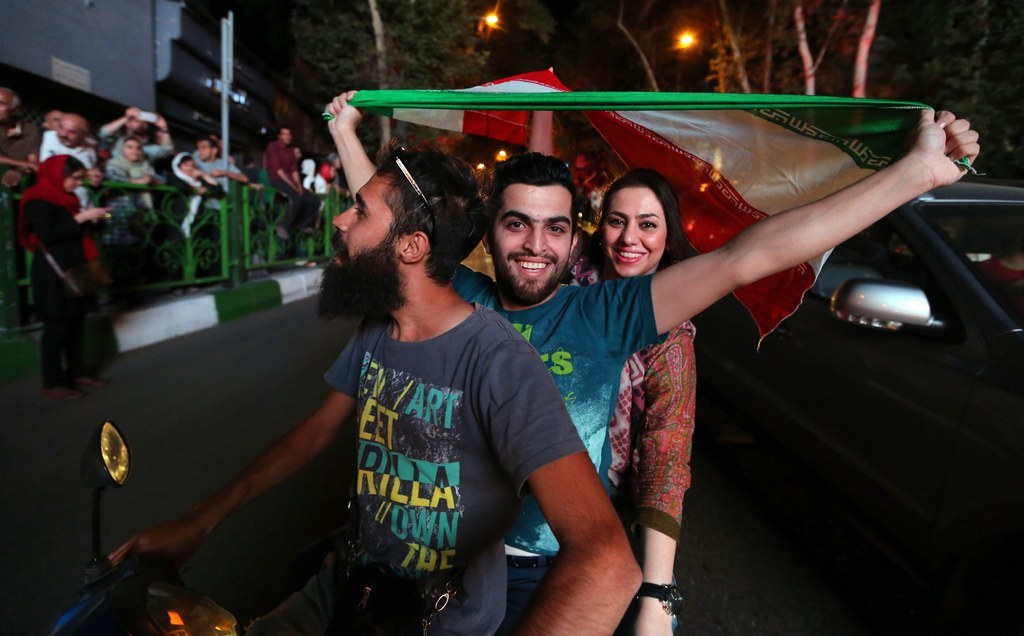
Defense Secretary Ash Carter released a statement congratulating the American negotiating team, but was quick to point out the U.S. military "will always be ready, to defend the United States and our interests":
I'm pleased that Secretary of State Kerry and Secretary of Energy Moniz, along with our P5+1 partners, were able to reach a comprehensive, verifiable deal to prevent Iran from obtaining a nuclear weapon. As we implement this historic agreement, deterrence remains a major component of America's national security.The Department of Defense is today, and will always be ready, to defend the United States and our interests. Our military -- including tens of thousands of U.S. forces in the Middle East -- are full speed ahead maintaining a strong presence in the Gulf. We remain prepared and postured to bolster the security of our friends and allies in the region, including Israel; to defense against aggression; ensure freedom of navigation in the Gulf; and check Iranian malign influence. We will utilize the military option if necessary.
The men and women of the Defense Department comprise the finest fighting force the world has ever known and will continue to carry out these and all missions with excellence.
Iran's supreme leader, the Ayatollah Khamenei, took to state television and Twitter on Tuesday to praise the work of his country's negotiating team.
#Iran's Leader praised& appreciated honest and hard endeavors and efforts made by nuclear negotiating team. #IranDeal
The Iranian TV broadcast said Khamenei met with President Rouhani and other cabinet members, where he expressed "appreciation and thanked the Iranian nuclear negotiators for their honest and diligent efforts," according to the AP.
The White House released a statement on Tuesday afternoon saying that President Obama had spoken with Israeli Prime Minister Benjamin Netanyahu to discuss the Iran deal.
.@WhiteHouse: Readout of the President’s Call with Prime Minister Benjamin Netanyahu of Israel
Netanyahu has been a fierce critic of the deal, which he described as an "historic mistake."
Israel's deputy minister of foreign affairs also described it as "a capitulation of historic proportions by the west to the Iran-led axis of evil."

Syrian President Bashar al-Assad sent his congratulations to Ali Khamenei and President Hassan Rouhani for having reached a nuclear deal, the Syrian Arab News Agency reported.
"Indubitably, this agreement crowns the steadfastness of the Iranian people, with all their components and inclinations, in the face of the unfair sanctions that were imposed on the Islamic Republic of Iran," he said.
The president called the accord a "major turning point" not only in Iran's history, but in the region and the world, because it solidifies and acknowledgement by world powers the "peacefulness of the Iranian nuclear program."
al-Assad added that his administration is "quite assured that the Islamic Republic of Iran will continue, with greater momentum, supporting the just issues of peoples and working for peace and stability to prevail in the region and the world."
According to SANA, in a statement released by the Foreign and Expatriates ministry of the Syrian government, the nuclear deal is "also a victory for the will of the Iranian people and developing countries in sticking to their right to possessing nuclear energy for peaceful purposes and using it to achieve sustainable development."
Congress to begin reviewing Iran nuclear deal soon.
Congress will soon begin reviewing the Iran nuclear agreement and will have 60 days before voting to accept it or reject it.
President Barack Obama said in a press conference Tuesday morning he would veto legislation to block the Iran deal. Congress needs a two-thirds majority in each house to override the veto.
The House Foreign Relations Committee will begin reviewing the deal on Tuesday.
Iranian President Hassan Rouhani said that the deal the country reached with world powers over its nuclear ambitions will “put an end to the inhumane and tyrannical sanctions,” during an address on Iranian state TV on Tuesday.

Reiterating earlier comments from his Foreign Minister Javad Zarif, Rouhani said the deal marked a "new chapter" in relations between the Islamic Republic with the rest of the world.
Rouhani added: "The sanctions regime was never successful but at the same time it had affected people's lives."
He also insisted that Iran had never intended to manufacture a nuclear bomb. This from AP:
Iranian President Hassan Rouhani has dismissed claims that the Islamic Republic sought to make atomic weapons under its nuclear program.Speaking live in a nationwide televised address Tuesday, Rouhani said: "Iran has never sought to manufacture a nuclear weapon and will never seek to manufacture a nuclear weapon."
He added: "The whole world knows very well that manufacturing a nuclear bomb ... is considered forbidden."
The comment came during a speech in which Rouhani sought to appease hard-liners about the merits of the nuclear deal agreed to in Vienna between the Islamic Republic and world powers.
British Prime Minister David Cameron released a statement which said world powers' nuclear deal with Iran would "help to make out world a safer place."
David Cameron's statement on Iran deal: "A deal... that will help to make our world a safer place."
John Kerry said the Iran deal "has been a long time coming."
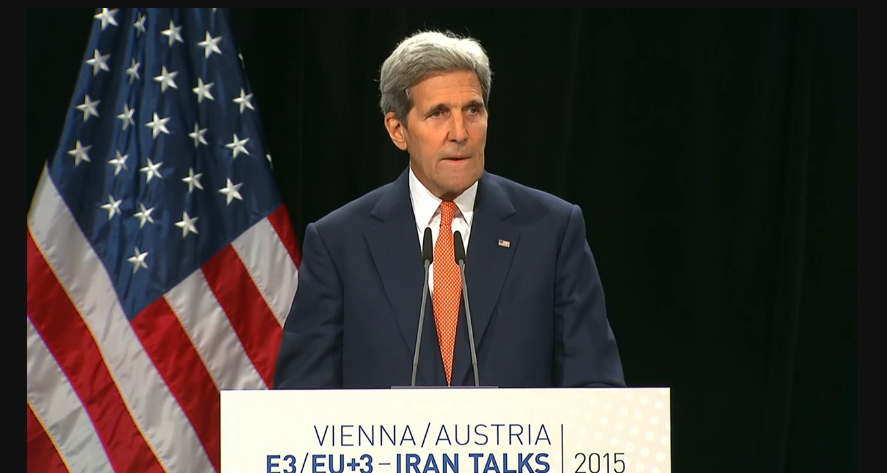
Secretary of State John Kerry said in a press conference Tuesday that the Iran nuclear agreement is the beginning of change in interactions between Iran and the international community – and stressed that the hard work is not over.
"Confidence is never built overnight, it has to be developed over time" he said.
Kerry added that the agreement is a good compromise for both sides.
"There will be some that will assert we could have done more, that Iran would eventually wave a white flag and abandon its nuclear program," Kerry said. "The international community tried that approach, and in the meantime, guess what happened? The Iranian program grew, despite fact that international community said 'no enrichment at all.'"
He also said that the agreement has certain provisions that would allow sanctions to "snap right back into place," if Iran fails to live up to its commitments.
Obama's address is being televised in Iran:
U.S. President Barack Obama live on Iran state TV right now
In a Tuesday morning press conference at the White House, President Obama said that he would veto any legislation in Congress that would prevent the implementation of the nuclear deal agreed between Iran and world powers.
.@POTUS: This deal is not built on trust, it's built on verification. #IranDeal
Flanked by Vice President Joe Biden, he insisted that he welcomed "a robust debate in Congress, and scrutiny of the details,” but said that "this is not the time for politics or posturing."
He added the agreement was "not built on trust, it is built on verification," and said it is "in line with tradition of American leadership.”
“Because U.S. negotiated from a position of strength and principle, we have prevented the spread of nuclear weapons in this region,” President Obama added.
The deal will see Iran "receive relief from the sanctions put in place because of their nuclear program” which will be “phased in”.
He also said that "our national security depends on preventing Iran from getting a nuclear weapon," and insisted that, had a deal not been in place, his successors may have had to to decide "whether to use our military to stop it."
"Put simply, no deal means a greater chance of more war in the Middle East," Obama said. "Moreover, we give nothing up by testing whether or not this problem can be solved peacefully. If, in a worst-case scenario, Iran violates the deal, the same options that are available to me today will be available to any U.S. President in the future."
Obama said inspectors will have 24/7 access to Iran's key nuclear facilities to ensure Iran stands by its commitments.
"[Inspectors] will have access to Iran's entire nuclear supply chain – its uranium mines and mills, its conversion facility, and its centrifuge manufacturing and storage facilities," he said. "This ensures that Iran will not be able to divert materials from known facilities to covert ones. Some of these transparency measure will be in place for 25 years."
If Iran violates the deal, Obama said sanctions will "snap back into place."
"So there's a very clear incentive for Iran to follow through, and there are very real consequences for a violation," he said.
Speaking at a news conference with Iran's Foreign Minister Javad Zarif, The European Union's Head of Foreign Policy, Federica Mogherini, said Iran's nuclear agreement with world powers was "not just a deal, but a good deal, and a good deal for all sides."
WATCH LIVE: Press conference in Vienna on #IranDeal http://t.co/PVo4zDT32U
Echoing Zarif's remarks earlier Monday morning, Mogherini said the deal provided the "conditions for shared trust, and a new chapter in our relationship."
She added that "despite all twists and turns… hope and determination enabled us to overcome all the difficult moments."
She said she hoped the deal would “positively contribute to regional and international peace and security.”
The deal would prevent Iran from seeking or developing nuclear weapons, Mogherini said:
"under no circumstances will #Iran seek or develop nuclear weapons" @FedericaMog @JZarif #irandeal
Federica Mogherini, the High Representative of the EU for Foreign Affairs and Security Policy, tweeted:
#IranTalks done. We have the agreement. #IranDeal
The Russian government posted what appears to be the text of the deal on the Ministry of Foreign Affairs web site:
President Obama will deliver remarks on Iran at 7 a.m. ET, the White House said.
Briefly addressing the media in Vienna alongside other world leaders Tuesday morning, Iranian Foreign Minister Javad Zarif said the deal was "historic" and a "win-win solution," but said it was "not perfect." He said it marked a "new chapter of hope."
FM Zarif: 'Today could have been the end of hope, instead we have opened a new chapter of hope'.
Zarif and the other world leaders reconvened for the plenary session following the short media address.
Iran's president said the "crisis" is "resolved."
#IranDeal shows constructive engagement works. With this unnecessary crisis resolved, new horizons emerge with a focus on shared challenges.
A plenary meeting of the European Union will start soon, followed by a news conference.
#IranTalks UPDATE: Final plenary of EU/P5+1 & Iran at 10:30 am Vienna time at UN. Will be followed by a press conference at Austrian Center.
Iran's president tweeted that his country and the International Atomic Energy Agency have agreed to cooperate:
Just now, Iran and @iaeaorg agree to accelerate cooperation with aim to fully resolve all prior issues. #IranTalks
Here's how Israel's deputy minister for foreign affairs reacted to news of the deal:
This agreement is a capitulation of historic proportions by the west to the Iran-led axis of evil.
And Israeli Prime Minister Benjamin Netanyahu called the agreement a "historic mistake" in this tweet:
כשמוכנים לעשות הסכם בכל מחיר - זאת התוצאה. מהדיווחים הראשונים שמגיעים אפשר לקבוע כבר עכשיו שההסכם הזה הוא טעות היסטורית לעולם.
In an achievement sought for years, Iran and six world powers have agreed to a deal that curbs Iran's nuclear program in exchange for relief from crippling international sanctions.
The historic deal, which was reported early Tuesday in Vienna, comes after years of wrangling between Iran and the U.S. and other world powers that have long demanded that Iran suspend its nuclear program — which critics say could be used to build a nuclear arsenal — in exchange for tens of billions of dollars in economic sanction relief.
Iran has insisted its nuclear program is for domestic purposes, but members of the U.N. Security Council say the nation has the infrastructure to one day produce significant amounts of weapons-grade plutonium.
Under the framework reached in April, Iran agreed to make significant changes to its nuclear infrastructure to make it nearly impossible to build a weapon. Those concessions include redesigning and rebuilding a heavy water research reactor in Arak after getting rid of its core. Iran also agreed to reduce the number of installed centrifuges and to give international inspectors regular access to all its nuclear facilities.
Officials were hinting for days that a final deal was imminent as negotiators haggled over last-minute details. The exact language of the final deal was not immediately available, but diplomats told the Associated Press and Reuters that an agreement was reached after final obstacles were cleared.
"All the hard work has paid off and we sealed a deal," an Iranian diplomat told Reuters on condition of anonymity. "God bless our people."
The agreement, which must still get final approval from the U.N. Security Council in the form of a resolution, came amid a flurry of last-minute marathon negotiating that became more intense after missing a key deadline on June 30, and three subsequent targets in July. Each time, the U.S. — negotiating with Iran as part of the P5+1 bloc that also includes Britain, China, France, Germany, and Russia — warned that it was willing to walk away.
U.N. attempts to curb Iran's nuclear ambitions have failed in the past, but a new effort was kickstarted after Iranian President Hassan Rouhani came to power in 2013.
An interim deal was reached in November, but two deadlines for a final agreement were missed later in the year, setting the stage for another round of talks in Vienna.
Among the biggest sticking points was Iran's insistence that a U.N. arms embargo on its ballistic missile program be lifted.


